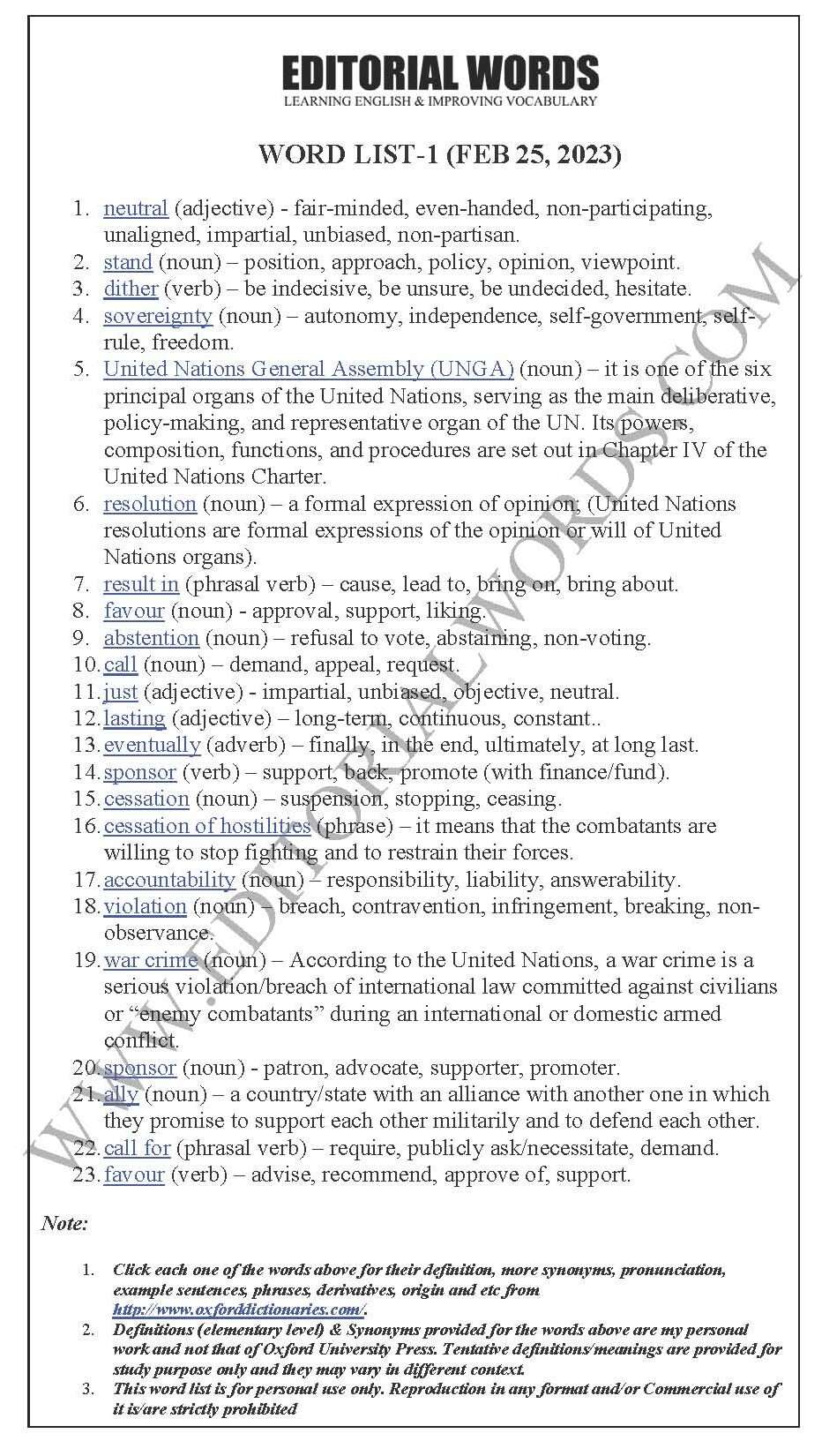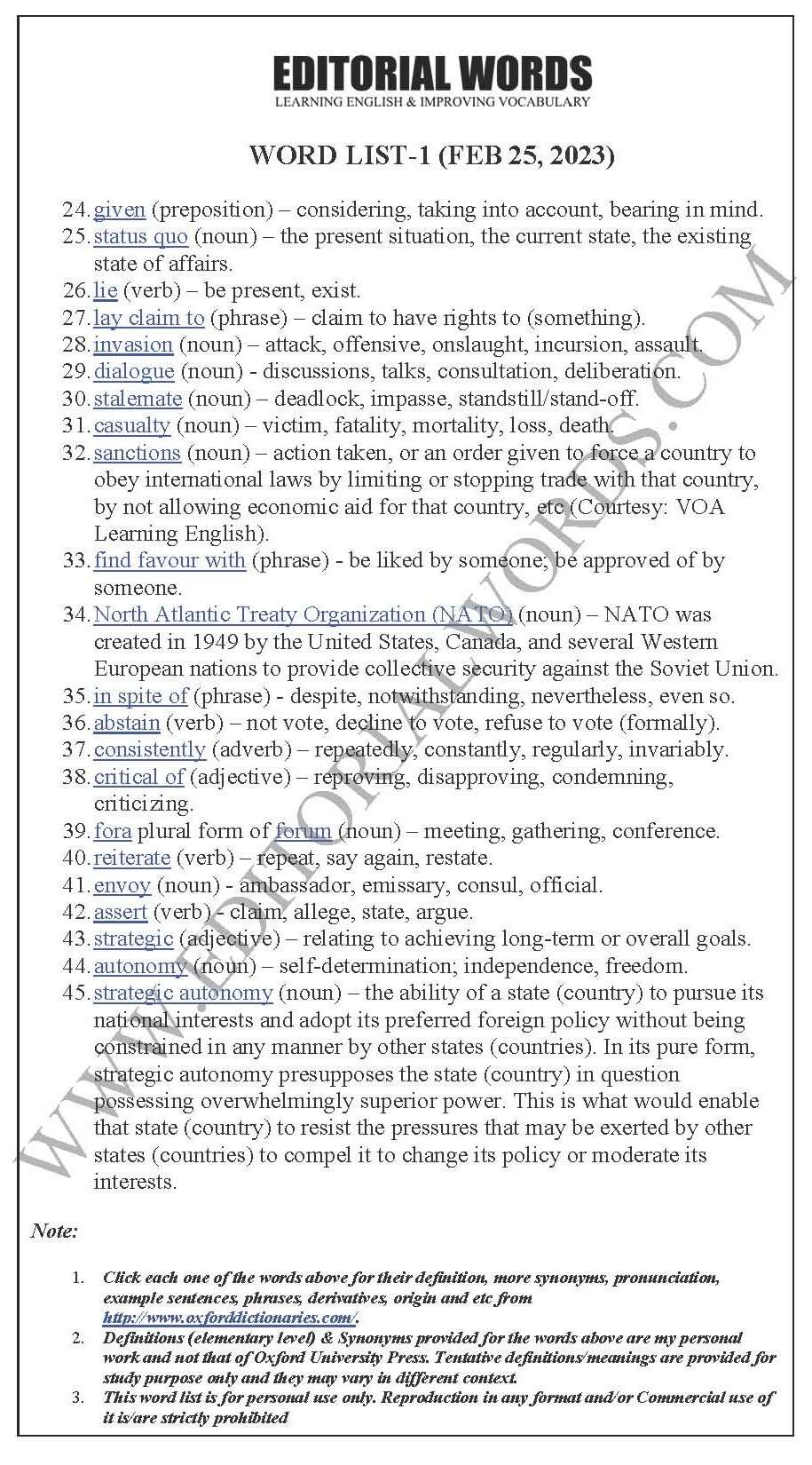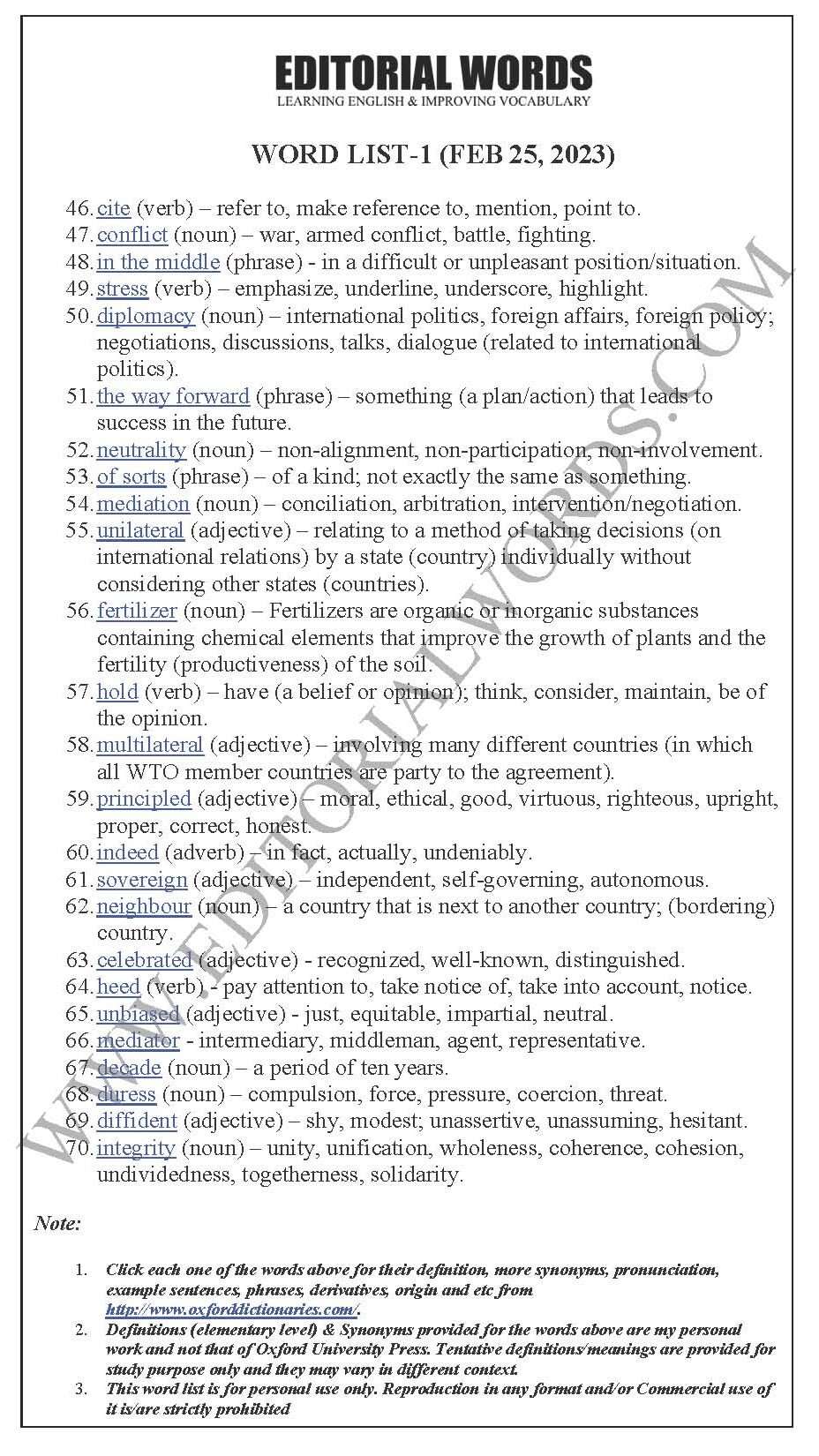The Hindu Editorial (Not neutral) – Feb 25, 2023
To read this article, click “The Hindu”.
This preview is provided here with permission.
Courtesy: The Hindu
The Hindu Editorial (Not neutral) – Feb 25, 2023
- neutral (adjective) – fair-minded, even-handed, non-participating, unaligned, impartial, unbiased, non-partisan.
- stand (noun) – position, approach, policy, opinion, viewpoint.
- dither (verb) – be indecisive, be unsure, be undecided, hesitate.
- sovereignty (noun) – autonomy, independence, self-government, self-rule, freedom.
- United Nations General Assembly (UNGA) (noun) – it is one of the six principal organs of the United Nations, serving as the main deliberative, policy-making, and representative organ of the UN. Its powers, composition, functions, and procedures are set out in Chapter IV of the United Nations Charter.
- resolution (noun) – a formal expression of opinion; (United Nations resolutions are formal expressions of the opinion or will of United Nations organs).
- result in (phrasal verb) – cause, lead to, bring on, bring about.
- favour (noun) – approval, support, liking.
- abstention (noun) – refusal to vote, abstaining, non-voting.
- call (noun) – demand, appeal, request.
- just (adjective) – impartial, unbiased, objective, neutral.
- lasting (adjective) – long-term, continuous, constant..
- eventually (adverb) – finally, in the end, ultimately, at long last.
- sponsor (verb) – support, back, promote (with finance/fund).
- cessation (noun) – suspension, stopping, ceasing.
- cessation of hostilities (phrase) – it means that the combatants are willing to stop fighting and to restrain their forces.
- accountability (noun) – responsibility, liability, answerability.
- violation (noun) – breach, contravention, infringement, breaking, non-observance.
- war crime (noun) – According to the United Nations, a war crime is a serious violation/breach of international law committed against civilians or “enemy combatants” during an international or domestic armed conflict.
- sponsor (noun) – patron, advocate, supporter, promoter.
- ally (noun) – a country/state with an alliance with another one in which they promise to support each other militarily and to defend each other.
- call for (phrasal verb) – require, publicly ask/necessitate, demand.
- favour (verb) – advise, recommend, approve of, support.
- given (preposition) – considering, taking into account, bearing in mind.
- status quo (noun) – the present situation, the current state, the existing state of affairs.
- lie (verb) – be present, exist.
- lay claim to (phrase) – claim to have rights to (something).
- invasion (noun) – attack, offensive, onslaught, incursion, assault.
- dialogue (noun) – discussions, talks, consultation, deliberation.
- stalemate (noun) – deadlock, impasse, standstill/stand-off.
- casualty (noun) – victim, fatality, mortality, loss, death.
- sanctions (noun) – action taken, or an order given to force a country to obey international laws by limiting or stopping trade with that country, by not allowing economic aid for that country, etc (Courtesy: VOA Learning English).
- find favour with (phrase) – be liked by someone; be approved of by someone.
- North Atlantic Treaty Organization (NATO) (noun) – NATO was created in 1949 by the United States, Canada, and several Western European nations to provide collective security against the Soviet Union.
- in spite of (phrase) – despite, notwithstanding, nevertheless, even so.
- abstain (verb) – not vote, decline to vote, refuse to vote (formally).
- consistently (adverb) – repeatedly, constantly, regularly, invariably.
- critical of (adjective) – reproving, disapproving, condemning, criticizing.
- fora plural form of forum (noun) – meeting, gathering, conference.
- reiterate (verb) – repeat, say again, restate.
- envoy (noun) – ambassador, emissary, consul, official.
- assert (verb) – claim, allege, state, argue.
- strategic (adjective) – relating to achieving long-term or overall goals.
- autonomy (noun) – self-determination; independence, freedom.
- strategic autonomy (noun) – the ability of a state (country) to pursue its national interests and adopt its preferred foreign policy without being constrained in any manner by other states (countries). In its pure form, strategic autonomy presupposes the state (country) in question possessing overwhelmingly superior power. This is what would enable that state (country) to resist the pressures that may be exerted by other states (countries) to compel it to change its policy or moderate its interests.
- cite (verb) – refer to, make reference to, mention, point to.
- conflict (noun) – war, armed conflict, battle, fighting.
- in the middle (phrase) – in a difficult or unpleasant position/situation.
- stress (verb) – emphasize, underline, underscore, highlight.
- diplomacy (noun) – international politics, foreign affairs, foreign policy; negotiations, discussions, talks, dialogue (related to international politics).
- the way forward (phrase) – something (a plan/action) that leads to success in the future.
- neutrality (noun) – non-alignment, non-participation, non-involvement.
- of sorts (phrase) – of a kind; not exactly the same as something.
- mediation (noun) – conciliation, arbitration, intervention/negotiation.
- unilateral (adjective) – relating to a method of taking decisions (on international relations) by a state (country) individually without considering other states (countries).
- fertilizer (noun) – Fertilizers are organic or inorganic substances containing chemical elements that improve the growth of plants and the fertility (productiveness) of the soil.
- hold (verb) – have (a belief or opinion); think, consider, maintain, be of the opinion.
- multilateral (adjective) – involving many different countries (in which all WTO member countries are party to the agreement).
- principled (adjective) – moral, ethical, good, virtuous, righteous, upright, proper, correct, honest.
- indeed (adverb) – in fact, actually, undeniably.
- sovereign (adjective) – independent, self-governing, autonomous, non-aligned.
- neighbour (noun) – a country that is next to another country; (bordering) country.
- celebrated (adjective) – recognized, well-known, distinguished.
- heed (verb) – pay attention to, take notice of, take into account, notice.
- unbiased (adjective) – just, equitable, impartial, neutral.
- mediator – intermediary, middleman, agent, representative.
- decade (noun) – a period of ten years.
- duress (noun) – compulsion, force, pressure, coercion, threat.
- diffident (adjective) – shy, modest; unassertive, unassuming, hesitant.
- integrity (noun) – unity, unification, wholeness, coherence, cohesion, undividedness, togetherness, solidarity.
Note:
1. Click each one of the words above for their definition, more synonyms, pronunciation, example sentences, phrases, derivatives, origin and etc from http://www.oxforddictionaries.com/.
2. Definitions (elementary level) & Synonyms provided for the words above are my personal work and not that of Oxford University Press. Tentative definitions/meanings are provided for study purpose only and they may vary in a different context.
3. This word list is for personal use only. Reproduction in any format and/or Commercial use of it is/are strictly prohibited.
The Hindu Editorial (Not neutral) – Feb 25, 2023:



“Phrasal Verbs” We Learnt Last Week
“Idioms & Phrases” We Learnt Last Week
“Important Definitions” We Learnt Last Week
Recent Word Lists For The Hindu Editorial Articles

Nearly one year to the date of Russian President Vladimir Putin’s launch of attacks on Ukraine (February 24, 2022), the UN General Assembly’s vote on the latest resolution to criticise Russia resulted in 141 votes in favour,… For further reading, visit “The Hindu”. Below is today’s word list-1 for The Hindu Editorial (Not neutral) – Feb 25, 2023.